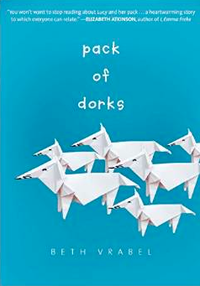In Beth Vrabel's pitch perfect debut middle grade novel "Pack of Dorks," a 4th grader named Lucy finds her world in upheaval when she falls from her status as popular girl to loner dork, at the same time that her baby sister's birth throws her family into turmoil. A school report on wolves helps Lucy to both make sense of the brutality of the elementary school social hierarchy, and find a way to transcend the bullying of her classmates.
In a starred review, Kirkus Review writes: "Lucy's perfectly feisty narration, the emotionally resonant situations and the importance of the topic all elevate this effort well above the pack."
I spoke with Beth Vrabel about "Pack of Dorks."
Mary Pauline Lowry (MPL): The narrator of "Pack of Dorks"--a 4th grader named Lucy--has a new baby sister. Though Lucy knows her sister has Down's syndrome, she immediately finds the baby to be "perfect." At the same time, Lucy's parents feel grief that their new baby has Down's and part of their concern is about what other people will think, and how the baby will be treated. Could you talk a bit about these two different reactions to a baby being born with Down's?
Beth Vrabel (BV): Lucy's expectation is that she's getting a baby sister. And that's exactly what happened. So she's thrilled that Molly is here, and to her, she's perfect. Lucy's mom and dad, like all parents, have expectations that are much further reaching. While Lucy is blessedly in the moment, her parents look at this new life and see the pain of falling behind at school, of being dependent through adulthood, of altering their definition of success. I felt it was important that her parents react authentically and be given the opportunity to grieve the child they thought they were going to have. That doesn't mean for a second that they treat Molly with anything but love. They, like Lucy, immediately adore the baby; they just are given time to alter their expectations.
MPL: Ostracized by her best friend and picked on by several kids at school, Lucy finds a way to make sense of her situation by studying the behavior of wolves. How did you come up with this idea of using wolf packs as a metaphor for the sometimes brutal behavior of elementary school kids?
BV: Like Lucy, I wrote a report about wolves in elementary school. This was during the push to reintroduce wolves to Yellowstone National Park. I must've written a dozen letters to the Department of the Interior, pushing for the reintroduction. The walls of my bedroom were plastered with maps of the park, posters of wolves, and truly horrible drawings! What captured my imagination was the idea of a pack forming a family. Each member of a wolf pack serves a purpose, from leading the hunt to watching the pups. Isn't that what middle grade years are all about--finding your purpose and place among your peers? But there is a place on the wolf pack hierarchy I struggled to understand: The scapegoat. Here's a member of this society who's pushed to the side, ganged up on by the others, and last to have everything. That's its job. If the scapegoat fights back, he risks being banished from the pack. I think that's how a lot of bullied kids feel, stuck in their position. In "Pack of Dorks," Lucy goes from the top of her school hierarchy smack down to scapegoat. Climbing back up seems impossible. She sees other "residents of Dorkdom" accept where they are and how they're treated. But, of course, Lucy doesn't.
MPL: Lucy's grandmother convinces a reluctant Lucy to take a karate class. At first I was hoping Lucy would give one of the mean kids at school a karate chop, but I loved that the class had other (non-violent) benefits. Why was it important for Lucy to get out of her comfort zone in a really physical way?
BV: This is one of those things that bled onto the page from real life. My children are in martial arts. I like knowing they can defend themselves if they have to, but I love the quiet confidence they've earned through the sport. It's so much more than landing a great kick or breaking a board (though those skills are pretty awesome). What I relish is the respect they have for their instructors, their classmates and, most importantly, themselves. That's what I wanted Lucy--and especially fellow loner April--to experience.
MPL: What inspired you to write middle grade fiction?
BV: Many of my favorite books of all time just happen to be middle grade fiction. We even named our guinea pig Winn-Dixie! I love the growth that happens to characters in this genre. They're making sense of themselves, but also the world around them.
MPL: What are you hoping readers will take away from "Pack of Dorks"?
BV: There is a moment in "Pack of Dorks" where Lucy feels desperately alone. She feels she can't turn to her parents now that they have a whole syndrome to manage. Her classmates either join in on being cruel to her or they ignore her. She has no one. All of that changes when Sam sits next to her in the cafeteria. One kindness keeps Lucy afloat. That's what I hope readers take away from "Pack of Dorks," the power of kindness.

